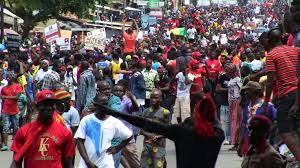

Ahead of this month’s presidential poll, Amnesty International said Guinea has failed to hold security forces accountable for the lethal crackdown on anti-government protests since last year.
At least 50 people were killed during protests against President Alpha Conde between October 2019 and July 2020 in the West African state, the rights group said in a report.
At least another 70 were arrested over the same period, or held in detention incommunicado, ‘for only exercising their right to freedom of expression or peaceful assembly and denouncing authoritarian excesses of power’, it added.
The report comes ahead of the October 18 presidential election in Guinea, where Conde is running for a controversial third presidential term.
Mass protests against that possibility began in October last year, but the president defied opposition and pushed through a new constitution in March, allowing him to reset the two-term presidential limit to zero.
The pushback against a Conde third term was met with a violent crackdown, according to Amnesty’s 63-page report, leaving victims reluctant to seek justice for fear of reprisals.
Based on interviews with more than 100 people, the report also pointed to the military’s involvement in policing the protests, ‘in violation of national legislation’.
Among other alleged abuses, mortuaries refused to receive the bodies of people killed during protests, resulting in few official reports on demonstration deaths, the report said.
‘All these human rights violations went unpunished,’ Amnesty said, adding that the government failed to investigate the killings and hold the perpetrators to account.
Guinea’s security ministry, in a response to the Amnesty report said the NGO failed to present a ‘neutral’ view of events. It added that it had ‘amply demonstrated its commitment to respect fundamental freedoms,’ particularly on behalf of opposition activists.
Protest deaths remain a regular occurrence, however.
Amnesty on Thursday urged Guinea to end the impunity of its security forces and to cover the medical costs for injured protesters. It also called on the international community to ‘continue to denounce these human rights violations and remind Guinea of its international obligations’.
more recommended stories
 New Director Appointed: Burao Hospital’s Fall and the Fight for Revival
New Director Appointed: Burao Hospital’s Fall and the Fight for RevivalBurao Hospital begins a new chapter.
 Somaliland: While Mogadishu Burns, Somalia Seeks Chaos in Sool
Somaliland: While Mogadishu Burns, Somalia Seeks Chaos in SoolHargeisa, April 9, 2025 – (Somaliland.com).
 Somaliland Presidency Delivers 10 Vital Dialysis Machines to Hargeisa Group Hospital
Somaliland Presidency Delivers 10 Vital Dialysis Machines to Hargeisa Group HospitalHargeisa – Somaliland – The President.
 Electricity Without Accountability: Public Outrage Grows in Burao Electricity Debate
Electricity Without Accountability: Public Outrage Grows in Burao Electricity DebateHigh electricity costs in Burao have.

